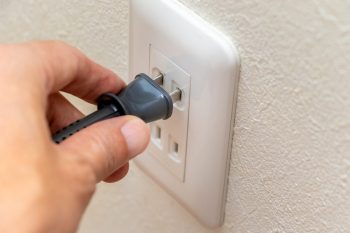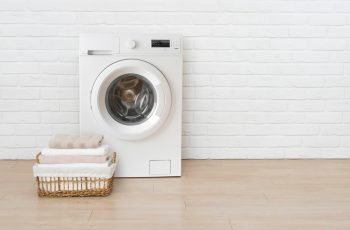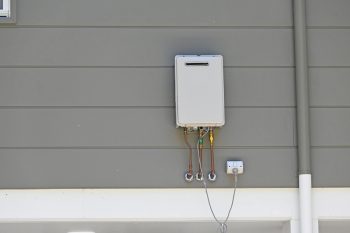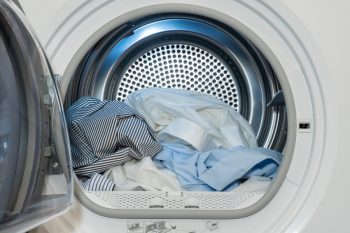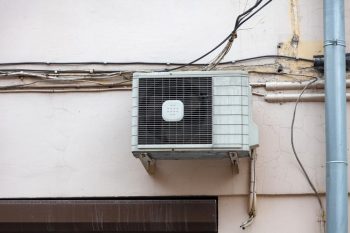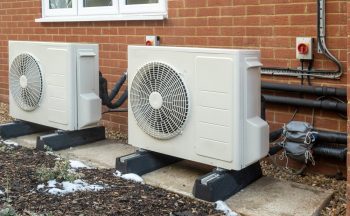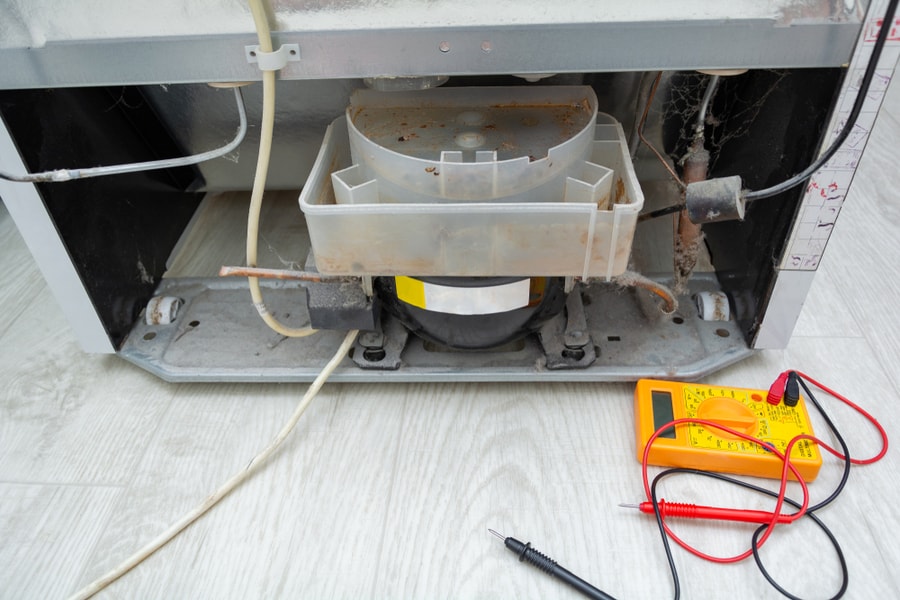
Refrigerators are one of the most common kitchen appliances. They play an important role in ensuring that your food is kept fresh for a longer time. A malfunctioning fridge or leaky pipes is an inconvenience and a health hazard.
One of the most common issues with old refrigerators is leaking freon. If the fluid level is low, it can cause the unit to become less efficient, resulting in potential breakdowns and high energy bills.
This post will examine freon refrigerants and how to fix any leaks in your refrigeration unit.
If your refrigerator is leaking freon, the best thing to do is call a repair professional to handle it. During the repairs, the expert will:
- Turn off and unplug the refrigerator
- Remove the unit’s back cover
- Locate the leak
- Patch the leak
- Refill the freon
In addition, we will also look at what freon is and the symptoms of a leaking refrigerator unit.
What Is Freon in Refrigerators?
Freon is an odorless and non-flammable refrigerant used in refrigerators and air conditioners to cool units. The refrigerant is also regarded as R-22 (Dichlorodifluoromethane).
In a nutshell, freon transfers heat from the air inside your unit’s compartments. The evaporator fan blows warm air from the compartments towards the evaporator coil.
Freon circulates inside the evaporator coils pulling in the heat from the warm air and cooling it down before the air is released back into the freezer.
Freon Refrigerant Discontinued
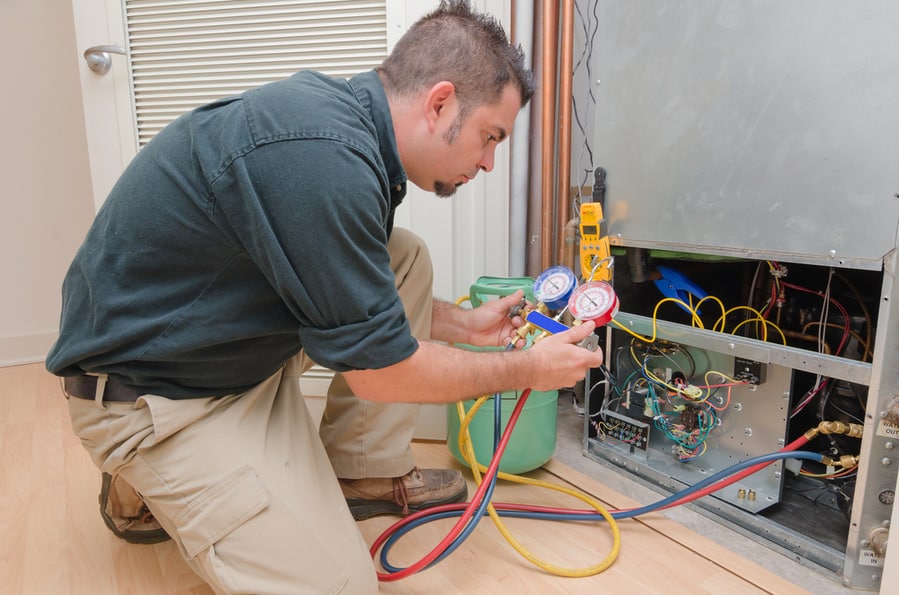
Freon refrigerants are common in old refrigerator models. However, using freon refrigerants raised a huge concern due to their environmental effects.
Most fridge manufacturers stopped making these units in the 1990s, replacing them with the more environmentally-friendly refrigerant, Tetrafluoroethane (R -134a).
With the discontinuation of Freon refrigeration units, any repairs to the units require a certified technician with special permits to purchase Freon.
Signs of a Freon Leak
If you suspect that your refrigeration unit is leaking freon, here are some common symptoms that you should look for:
1. Refrigerator Feels Warm
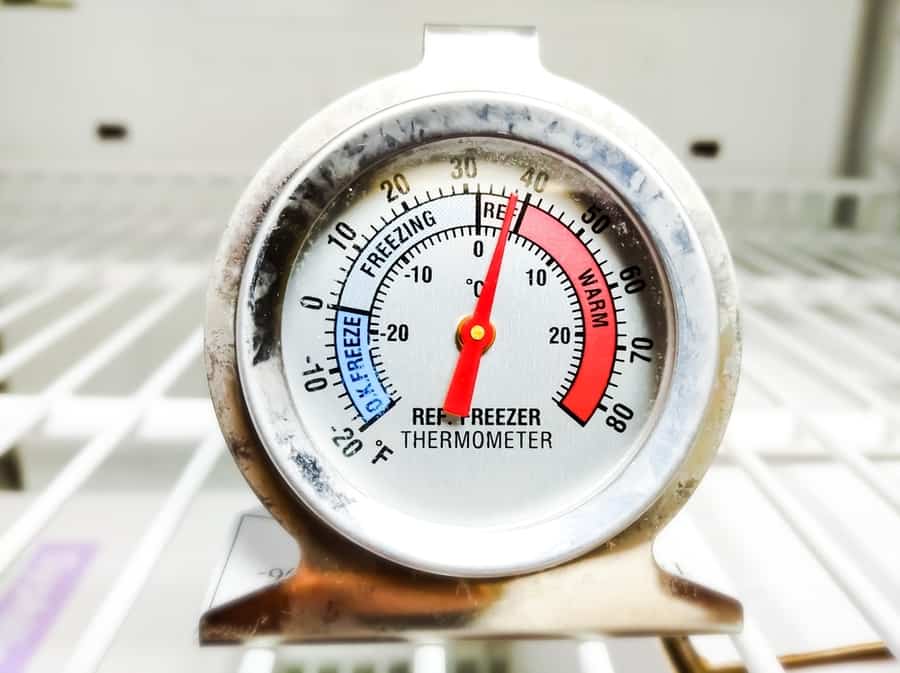
Warm refrigerant compartments are the most common way to identify if your refrigerant is leaking. As previously stated, the refrigerant absorbs heat inside the fridge’s compartment.
When the freon levels are low, it interferes with the heat transfer process.
2. The Fridge Is Constantly Running

The thermostat is responsible for detecting temperature changes in the refrigerator. Low freon levels in the unit cause heat transfer inefficiency, making it difficult for the deep freezer to reach the desired temperature.
When this happens, the compressor continuously runs to cool the refrigerator.
As the compressor continues to run due to low freon levels, it can lead to more wear and tear to the unit, leading to costly repairs in the future.
3. Odd Smells

Though freon is odorless, there is a fair chance that when it starts leaking, you might notice a stale, damp, or moldy smell. Instead of ignoring the smell, the safest bet is to check for any refrigerant leaks.
4. Visible Residue

Freon is composed of a mixture of chemicals that are in a condensed liquid state. When the refrigerant leaks, it might also escape as a liquid, leaving an oily or greasy residue on the surface of the broken pipe or the floor.
Freon is highly toxic and can be harmful to your body. Do not attempt to touch the oily or greasy residue without wearing protective gloves and a gas mask.
5. Health Issues

Limited exposure to the freon refrigerant can cause headaches, nausea, fatigue, and fainting. However, prolonged exposure can lead to respiratory problems and shortness of breath.
5 Steps To Fix Freon Leak in Refrigerator
Unfortunately, though it might seem like an easy patching DIY project, fixing leaking freon is not as simple as you think.
Unless you are a certified technician, your safest bet after realizing your freon refrigerator is leaking is to turn the unit off and call a professional.
As previously stated, a certified professional is the only person who should fix the leaking Freon in your refrigerator. Apart from legal reasons and the risk of damaging the unit more, the refrigerant is highly toxic, and mishandling it can lead to harmful health effects.
Here are a few steps to help fix a leaking Freon pipe in the fridge:
1. Turning Off and Unplugging the Refrigerator

The first thing you need to do is to turn off the refrigerator and unplug it from the wall outlet.
Turning off the fridge ensures that running processes within the unit are stopped, including the compressor that pumps, preventing further leaks.
2. Remove the Unit’s Back Cover
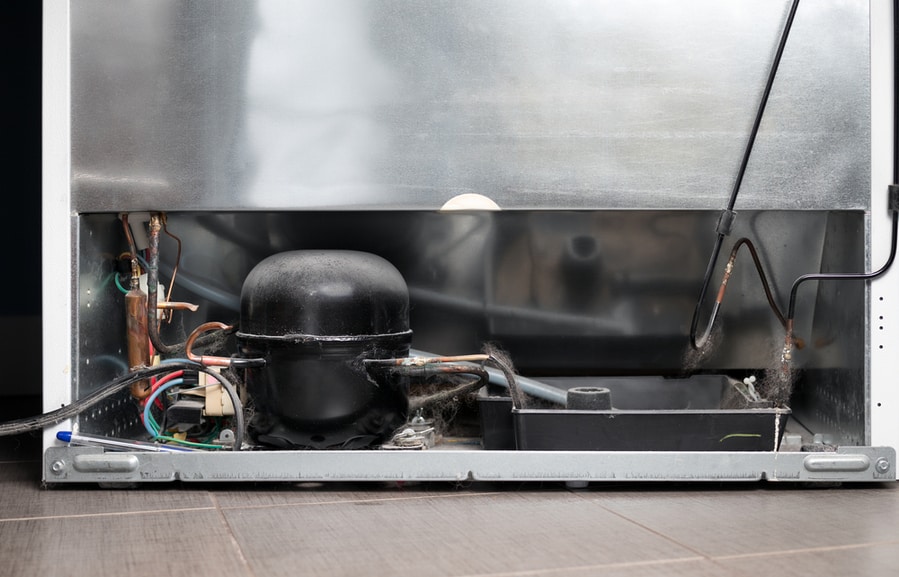
The back cover protects the delicate parts of the freezer, like the compressor, refrigerant pipes, and condenser.
Removing the back cover gives you better access to the refrigerant tubes, making it easy to identify and repair them.
3. Locating the Leak
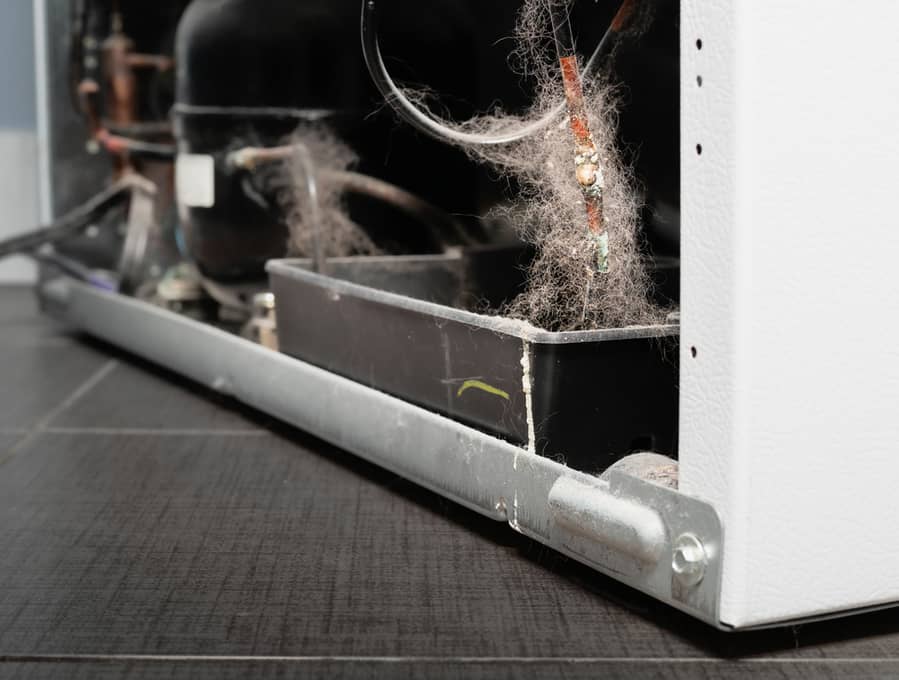
There are a couple of useful ways that a technician can utilize to identify the leak. However, it depends on their level of expertise and the repair tools available.
Let us have a look at some of these procedures:
Visual Inspection: One of the most common ways to identify a freon leak in a fridge is through visual inspection. The professional looks for any oil residue that forms around the surface of the pipe made as the fluid escapes.
Fluorescent Leak Detector: Fluorescent leak detectors are also common when looking for freon leaks. A fluorescent agent is added to the cooling system, and the fridge is left to run for a couple of minutes. Afterward, the technician inspects the cooling system using fluorescent light to detect any glow indicating a leak.
Soapy Water: Another way is by using soapy water. The repair technician fills the cooling system with pressurized nitrogen and applies soapy water to the refrigerant pipes. If the soapy water starts bubbling at a particular point, it indicates a tear, which could lead to a leak.
Electronic Leak Detector: An electronic leak detector is the most effective and accurate method of locating a leak. The detector has a probe that can be moved along the cooling system. When a leak is detected, the detector gives off an alert around the broken pipe, compressor, or condenser.
Gas Pressure Detector: The repair expert can also use a gas pressure detector to identify if the freon refrigerator leaks. The detector analyzes the difference in gas pressure in the cooling system. However, this detector is only good for checking if the unit’s cooling system is leaking, but it will not find the leak.
4. Patching the Leak
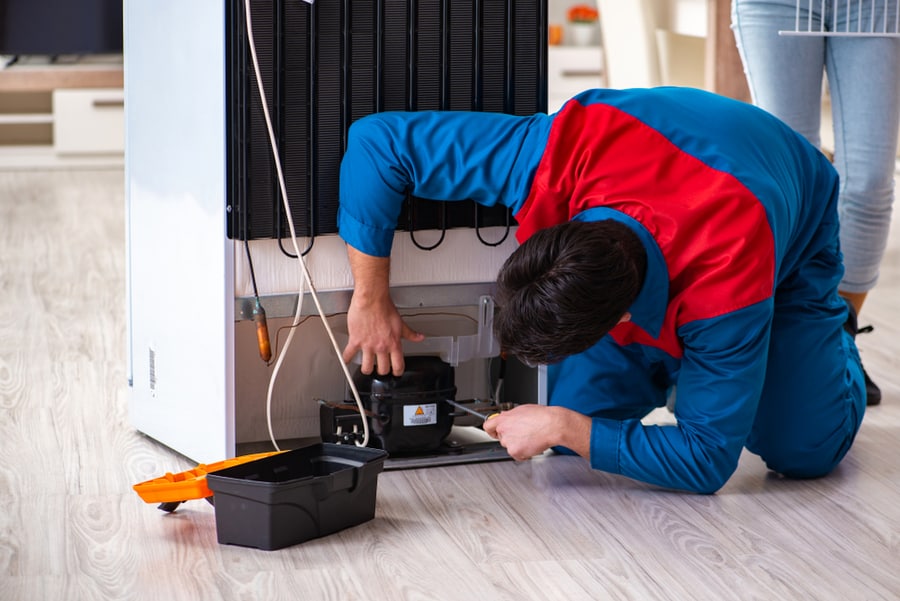
After locating the leak, the next thing to do is patch up the area. There are two major ways a repair professional can do this:
Using a Refrigerant Leak Sealant: A refrigerant leak sealant is a fluid added to the fridge cooling system to patch leaks. The fluid reacts and crystallizes when introduced to moisture. As the sealant is pumped with the refrigerant, it flows through the system until it finds a leak, where it oozes out and crystalizes around the hole, sealing it.
Because the sealant reacts with water, you must ensure that the refrigerator’s cooling system is moisture-free. If the system has water, the sealant might crystalize inside the components, blocking the refrigerant and damaging the parts.
Soldering the Refrigerant Pipes: Another way to fix the freon leak is by soldering the broken cracks and joints. The expert prepares the copper pipes by sanding and cleaning dirt around the crack. Afterward, a silver solder is heated and pressed against the crack to seal the leak.
5. Refilling the Freon
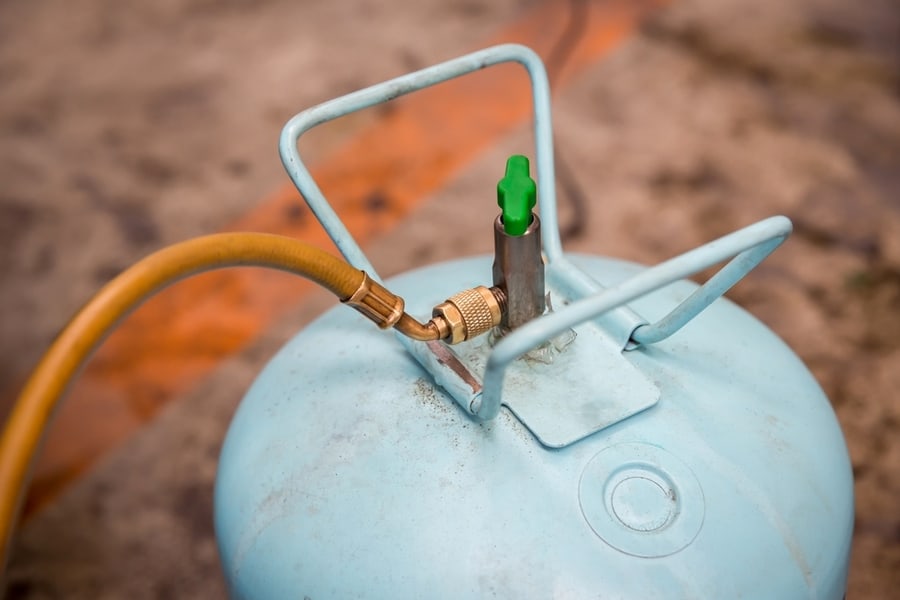
Lastly, the freon refrigerant must be refilled before the appliance is ready to work again.
The freon refrigerant is a controlled substance, and only certified professionals can buy it. This is another reason you should get an expert to fix your leak.
The technician refills the freon using an attached hose on a valve. Some refrigerators also require PAG oil to be added to the refrigerant when filling the system.
Conclusion
Regular maintenance is the best way to ensure your freezer works efficiently and prevents freon refrigerant leaks. You should always call a professional to help you with the repairs.
Before fixing the leak, a technician will turn off the refrigerator and remove the back cover. Afterward, they need to locate the leak, patch it up then refill the cooling system with refrigerant.
Frequently Asked Questions
Where Can You Buy Freon Refrigerant?
Unless you are a certified repair expert, you will not be able to buy the refrigerant for your AC or fridge. Freon refrigerant can be found in most HVAC and refrigeration repair shops.
How Can I Know if My Refrigerator Has Freon?
In most cases, any fridge manufactured after the late 1990s might not use freon as a refrigerant.
But you can also check the user manual or go online if you have trouble finding the unit’s refrigerant type.

